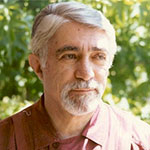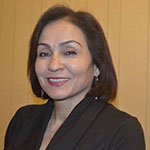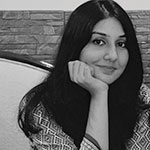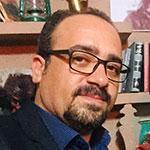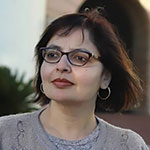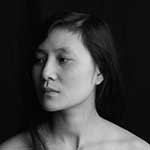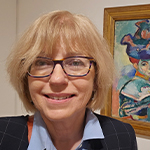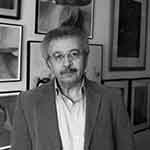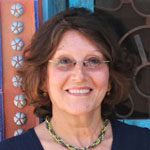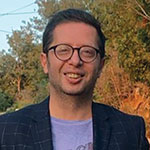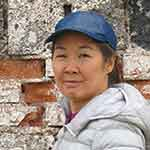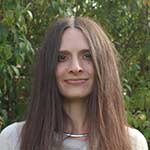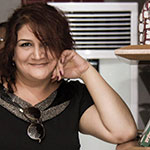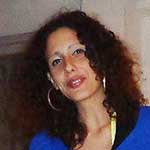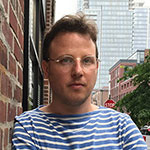Find your favorite authors featured in WLT or browse the entire list.
Nader Naderpour
Nader Naderpour (1929–2000) published his first collection of poetry in the 1940s. In the 1960s he directed the literature department of the Iranian National Radio and Television. He left Iran in 1980. Regarded as one of the leaders of the movement of “New Poetry” in Iran, he published nine collections of poems. Naderpour was nominated for the Nobel Prize in Literature and was awarded the Human Rights Watch Hellman-Hammett Grant in 1993.
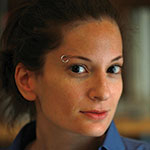
Photo by Yossi Zamirdiv>Mei-Tal Nadler
Mei-Tal Nadler received the 2014 Teva Prize in Poetry and the 2008 Ministry of Culture award for emerging poets. Her debut collection, Nisuyim be-chashmal (Experiments in electricity), was published last year. She is a doctoral candidate in Hebrew literature at Ben-Gurion University and a research fellow at the Israel Democracy Institute.
André Naffis-Sahely
André Naffis-Sahely’s (andrenaffis.com) first collection of poetry is The Promised Land: Poems from Itinerant Life (Penguin, 2017). His translations from French and Italian include works by Honoré de Balzac, Émile Zola, Alessandro Spina, Rashid Boudjedra, and Tahar Ben Jelloun. Beyond the Barbed Wire (Carcanet, 2016), his translation of the selected poems of Abdellatif Laâbi, received a Writers in Translation award from English PEN. His essay on Tangiers, “You’ll Never Leave: Seeking Salvation on the Shores of Morocco,” appears in the Winter 2019 issue of WLT.
Shahla Naghiyeva
Shahla Naghiyeva is an associate professor of translation and literature in the department of foreign literature of the Azerbaijan University of Languages.
Daljit Nagra
Daljit Nagra comes from a Punjabi background. He was born and raised in London, then Sheffield. He has won several prestigious prizes for his poetry. In 2004 he won the Forward Prize for Best Individual Poem with “Look We Have Coming to Dover!” This was also the title of his first collection, which was published by Faber & Faber in 2007 and won the Forward Prize for Best First Collection and the South Bank Show Decibel Award. Nagra is on the board of the Poetry Book Society. He has judged the Samuel Johnson Award 2008, the Guardian First Book Prize 2008, the Foyles Young Poets Competition 2008, and the National Poetry Competition 2009. He has also hosted the T. S. Eliot Poetry Readings 2009 and is a regular contributor to radio programs.
Hera Naguib
Hera Naguib is a poet and teacher based in Lahore, Pakistan. She is a graduate of the MFA in Writing program at Sarah Lawrence College in New York. Her poems have appeared or are forthcoming in Prairie Schooner, Beloit Poetry Journal, Spillway, diode, and elsewhere.
Lea Nagy
Lea Nagy is the recipient of an NKA grant (National Cultural Fund of Hungary). She has published two poetry collections, Kõhullás / Whirlwind and Légörvény / Stone Fall, with Editions Napkút in Budapest. She won the prize for Best Young Hungarian Poet in 2018. A French collection, Le chaos en spectacle, just came out from Éditions du Cygne in Paris.
Kawan Nahaee
Kawan Nahaee is a Kurdish poet, novelist, and short-story writer. Born in 1982 in Bane, eastern Kurdistan, he earned his master’s degree in art and architecture at Sine University. His novel ‘پێشەوا قاقا پێدەکەنێ’ (Pêşewa bursts out laughing), written in Kurdish, came out in 2018. He has published two collections of poetry written in Kurdish: وتم باران، نووسیت چەتر (I said rain, you wrote umbrella) and بۆب ئێسپەنجی لە ڕۆژهەڵاتی ناوەڕاست (SpongeBob in the Middle East). His forthcoming collection جەنگ (War) will appear in both languages. He won first prize for Kurdish-language poetry at the Pîranşar Festival of Modern Poetry in 2016 and first prize for a short story at the Bane International Story Festival in 2015.
Mini Nair
Mini Nair lives in Mumbai with her family. One of her story ideas about illegal embryo sex selection was made into a film by the nonprofit organization, Population First. She has published two books in India; an illustrated children's book and a pharmaceutical biography about B.V. Patel. The Fourth Passenger is her first novel.
Anita Nair
Anita Nair was born in Shoranur, Kerala, in 1966. She grew up in Chennai and later moved to Kerala, where she did her BA in English language and literature. She worked as an advertising writer before opting to write full-time in 2001. Nair is the author of several works of fiction and nonfiction:Satyr of the Subway and Eleven Other Stories, The Better Man, Ladies Coupé, Mistress, and Goodnight and God Bless. Her new novel is Lessons in Forgetting. She has also published a collection of poems, Malabar Mind, and has edited Where the Rain Is Born: Writings about Kerala. Her books have been translated into thirty languages worldwide. She lives in Bangalore.
Samina Najmi
A scholar of race, gender, and war in multiethnic American literature, Samina Najmi discovered the rewards of more personal kinds of writing in 2011. Her essay “Abdul” won Map Literary’s 2012 nonfiction prize. Samina grew up in Karachi and London and now calls California’s San Joaquin Valley home.
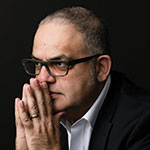
Photo by Beowulf Sheehandiv>Ruby Namdar
Ruby Namdar is an Israeli American author born and raised in Jerusalem to a family of Iranian-Jewish heritage. His first book, Haviv (2000), won the Ministry of Culture’s Award for Best First Publication. His novel The Ruined House (2013, Eng. 2017) won the Sapir Prize, Israel’s most prestigious literary award. He currently lives in New York City with his wife and two daughters and teaches Jewish literature, focusing on biblical and Talmudic narrative.
Weam Namou
Weam Namou was born in Baghdad, Iraq, as a minority Christian and came to America at age ten. The author of three novels, she is the co-founder and president of Iraqi Artists Association, and she writes for several local newspapers. Currently, she is working on a feature documentary, The Great American Family. Her poems "Dear Iraq" and "Miriam" appeared in the November 2007 issue of WLT.
Raha Namy
A writer and literary Persian<>English translator/editor, Raha Namy is currently a PhD candidate in creative writing, fiction, at the University of Denver. Her writing has appeared in Guernica, World Literature Today, Quarterly Conversation, Barcelona Review, Short Fiction Magazine, Baltimore Review, and elsewhere.
Vi Khi Nao
Vi Khi Nao's work includes poetry, fiction, film, and cross-genre collaboration. She is the author of Sheep Machine (2018); Umbilical Hospital (2017); the short-story collection A Brief Alphabet of Torture, which won FC2’s Ronald Sukenick Innovative Fiction Prize in 2016; the novel Fish in Exile (2016); and the verse collection The Old Philosopher, which won the Nightboat Books Prize for Poetry in 2014.
Susan Smith Nash
Susan Smith Nash’s PhD dissertation from the University of Oklahoma examined apocalyptic narratives in literary, film, and cultural texts. She has combined her passion for geology and energy technologies to develop programs that promote innovation and new solutions. Her latest projects involve a deep dive into Mexican cinema and the influence of the golden age of Mexican cinema.
Ibrahim Nasrallah
Writer, artist, and photographer Ibrahim Nasrallah was born in 1954 to Palestinian parents who were uprooted from their land in 1948. The author of fourteen poetry collections and twenty-two novels, his epic series of novels, The Palestinian Comedy, covers 250 years of modern Palestinian history. His novel Prairies of Fever was listed by the Guardian as one of the ten most important novels written about the Arab world. Among many other prizes for his work, in 2012 he won the inaugural Jerusalem Award for Culture and Creativity for his literary work.
Nawal Nasrallah
Nawal Nasrallah is an independent scholar specializing in the history and culture of Arab food. Her published works include Delights from the Garden of Eden (2013) and English translations of medieval Arabic cookbooks by Brill: Annals of the Caliphs’ Kitchens, by Ibn Sayyar al-Warraq; Treasure Trove of Benefits and Variety at the Table; and Best of Delectable Foods and Dishes from al-Andalus and al-Maghrib.
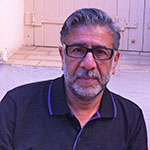
Photo by Hind Saroutdiv>Amjad Nasser
Amjad Nasser (b. 1955, Jordan) is one of the leading figures of his generation writing in Arabic today. He has published nine poetry collections, four lyric travel memoirs, and one novel, Land of No Rain (forthcoming from Bloomsbury Books). He is the cultural editor of the Arabic newspaper Al-Quds Al-Arabi and lives in London. Shepherd of Solitude (2009) is the first selected translation of his poetry in English, and his works have been translated into several languages.
Mohamad Nassereddine
Mohamad Nassereddine was born in 1977 in South Lebanon. He is the author of seven poetry collections, the most recent of which is Cages in Search of Birds (Dar al-Nahda al-Arabiyya, 2019). He holds a PhD in medical engineering and teaches at the Lebanese University. He is also a translator and cultural journalist who regularly publishes interviews, translations, and reviews in the cultural appendix of the Lebanese newspaper Al-Akhbar.
Zira Naurzbayeva
Zira Naurzbayeva holds a doctorate from Al-Farabi Kazakhstan State University. She is the author of several books on Kazakh mythology as well as co-author of a series of children’s adventure stories featuring legends and heroes from Kazakh myth. English translations of her work have been published in Words Without Borders and in Best Asian Short Stories 2019.
María José Navia
Chilean writer María José Navia (b. 1982) is the author of the novel SANT and the short-story collection Instrucciones para ser feliz. She is currently an assistant professor of Latin American literature at the Pontificia Universidad Católica de Chile. She writes literary reviews on her blog, www.ticketdecambio.wordpress.com, and you can also find her on Twitter: @mjnavia.
Liliana M. Naydan
Liliana M. Naydan is an associate professor of English and Chair of the English Program at Penn State Abington.
Michael M. Naydan
Michael M. Naydan is the Woskob Family Professor of Ukrainian Studies at the Pennsylvania State University. He has received numerous prizes for his translations, including the George S. N. Luckyj Award in Ukrainian Literature Translation from the Canadian Foundation for Ukrainian Studies in 2013. He has been writing about Ukrainian literature—and translating it—for WLT since 2005. His “Literary and Historical Sources for Understanding Ukraine” recommended reading list appeared in the July 2022 issue. Naydan and Alla Perminova’s translation of Zelensky: A Biography, by Serhii Rudenko, was published by Polity Books in 2022.
Rabiqe Nazim qizi
Rabiqe Nazim qizi was born in 1979 in Baku. She has worked for several newspapers as a reporter and translator. She has published two books of poetry (Up to You and Episodes of Love) and was awarded the Nasimi Prize for Literature and the “Umid Ishighi” (Hope’s Light) Prize in International Literature from the Rasul Rza Foundation.
Maria Nazos
Maria Nazos’s poetry, translations, and essays are published in the New Yorker, Cherry Tree, Birmingham Review, North American Review, Denver Quarterly, and Mid-American Review. She is the author of A Hymn That Meanders (Wising Up Press, 2011) and the chapbook Still Life (Dancing Girl Press, 2016). Maria has received scholarships and fellowships from the Sewanee Writers’ Conference, the University of Nebraska, where she received her PhD in creative writing, and the Vermont Studio Center. She lives with two crazy cats and a patient husband in Lincoln, Nebraska.
Etan Nechin
Etan Nechin is an Israeli writer living in New York. He is the online editor of The Bare Life Review: A Journal of Immigrant and Refugee Literature. His writing is published in Boston Review, ZYZZYVA, the Brooklyn Rail, the Independent, Apogee, Columbia Journal, and more. He is the recipient of the Felipe de Alba Award for Fiction.
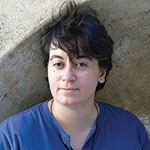
photo: mbaro01/wikimediadiv>Samira Negrouche
Samira Negrouche was born in Algiers where she still lives. She is a poet and translator, also a doctor, whose work crosses physical, linguistic, and artistic boundaries: she has frequently collaborated with visual artists and musicians, including the violinist Marianne Piketty, the theorbist Bruno Helstroffer, and the graphic artist Ali Silem. Poems of hers, in Marilyn Hacker’s translations, have appeared in journals including Banipal, Pleiades, upstreet, and PN Review.
Marilyn Nelson
Marilyn Nelson is the 2017 NSK Neustadt Laureate and the author or translator of some twenty poetry books, among them a biography-in-verse, Carver: A Life in Poems, a memoir-in-verse, How I Discovered Poetry, and a novel-in-verse, American Ace. Her The Fields of Praise: New and Selected Poems won the 1998 Poets’ Prize; Carver: A Life in Poems won the 2001 Boston Globe/Horn Book Award and the Flora Stieglitz Straus Award; Fortune’s Bones was a Coretta Scott King Honor Book and won the Lion and the Unicorn Award for Excellence in North American Poetry; and My Seneca Village won the Los Angeles Times Book Award for Young Adult Literature. Nelson’s honors include two NEA creative writing fellowships, the 1990 Connecticut Arts Award, a Fulbright Teaching Fellowship, a fellowship from the J. S. Guggenheim Memorial Foundation, the Frost Medal, and the NCTE Award for Excellence in Poetry for Children. She was Poet Laureate of the State of Connecticut from 2001 to 2006 and is currently Poet-in-Residence at Saint John the Divine’s American Poets Corner. Lubaya’s Quiet Roar, a picture book, is forthcoming from Dial Books.
Joshua B. Nelson
Joshua B. Nelson, a citizen of the Cherokee Nation and a native Oklahoman, is Assistant Professor of English and an affiliated faculty member with Native American Studies and Film & Video Studies at the University of Oklahoma. He earned his PhD and MA in English from Cornell and his BA in psychology from Yale. His current project, Progressive Traditions: Cherokee Cultural Studies, looks to dismantle the pervasive assimilated/traditional dichotomy plaguing American Indian literary criticism to explore the adaptive potential of traditional practices. He and his wife divide their time between Norman and Park Hill.
Pagination
